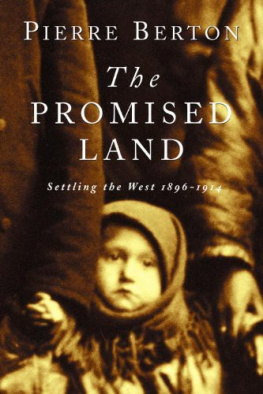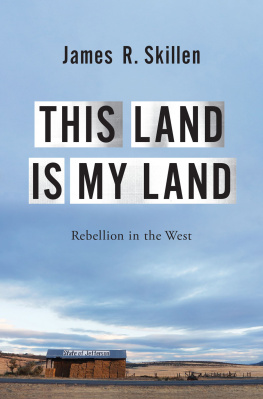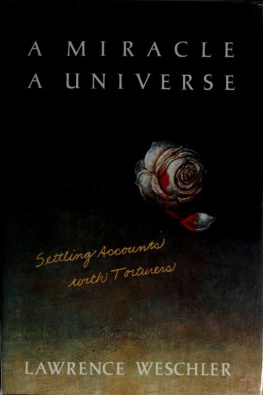Pierre Berton - The Promised Land: Settling the West 1896-1914
Here you can read online Pierre Berton - The Promised Land: Settling the West 1896-1914 full text of the book (entire story) in english for free. Download pdf and epub, get meaning, cover and reviews about this ebook. year: 2011, publisher: Anchor Canada, genre: Detective and thriller. Description of the work, (preface) as well as reviews are available. Best literature library LitArk.com created for fans of good reading and offers a wide selection of genres:
Romance novel
Science fiction
Adventure
Detective
Science
History
Home and family
Prose
Art
Politics
Computer
Non-fiction
Religion
Business
Children
Humor
Choose a favorite category and find really read worthwhile books. Enjoy immersion in the world of imagination, feel the emotions of the characters or learn something new for yourself, make an fascinating discovery.
- Book:The Promised Land: Settling the West 1896-1914
- Author:
- Publisher:Anchor Canada
- Genre:
- Year:2011
- Rating:4 / 5
- Favourites:Add to favourites
- Your mark:
- 80
- 1
- 2
- 3
- 4
- 5
The Promised Land: Settling the West 1896-1914: summary, description and annotation
We offer to read an annotation, description, summary or preface (depends on what the author of the book "The Promised Land: Settling the West 1896-1914" wrote himself). If you haven't found the necessary information about the book — write in the comments, we will try to find it.
The Promised Land: Settling the West 1896-1914 — read online for free the complete book (whole text) full work
Below is the text of the book, divided by pages. System saving the place of the last page read, allows you to conveniently read the book "The Promised Land: Settling the West 1896-1914" online for free, without having to search again every time where you left off. Put a bookmark, and you can go to the page where you finished reading at any time.
Font size:
Interval:
Bookmark:
Rating:Tags: History, Canada, General
Historyttt Canadattt Generalttt
After the pioneers described in The National Dream , The Last Spike and Klondike came the settlers a million people who filled a thousand miles of prairie in a single generation.
From the Trade Paperback edition.
Review
Theres a vitality and life in Bertons writing that is particularly striking after re-reading other accounts of the development of the Canadian West. -- The Toronto Star
From the Inside Flap
After the pioneers described in The National Dream , The Last Spike and Klondike came the settlers ? a million people who filled a thousand miles of prairie in a single generation.

Copyright 1984 by Pierre Berton Enterprises Ltd.
Anchor Canada edition 2002
All rights reserved. The use of any part of this publication, reproduced, transmitted in any form or by any means electronic, mechanical, photocopying, recording or otherwise, or stored in a retrieval system without the prior written consent of the publisher or, in the case of photocopying or other reprographic copying, a license from the Canadian Copyright Licensing Agency is an infringement of the copyright law.
Anchor Canada and colophon are trademarks.
National Library of Canada Cataloguing in Publication Data
Berton, Pierre, 1920
The promised land : settling the West, 18961914 / Pierre Berton. Anchor Canada ed.
eISBN: 978-0-385-67366-2
1. Prairie ProvincesEmigration and immigrationHistory. 2. MinoritiesPrairie ProvincesHistory. 3. Prairie ProvincesSocial conditions. 4. Prairie ProvincesHistory. I. Title.
FC3209.I4B47 2002 971.2O2 C2002-902700-4
F1060.9.B48 2002
Maps by Geoffrey Matthews
Published in Canada by
Anchor Canada, a division of
Random House of Canada Limited
Visit Random House of Canada Limiteds website: www.randomhouse.ca
v3.1
Books by Pierre Berton
The Royal Family The Mysterious North Klondike Just Add Water and Stir Adventures of a Columnist Fast Fast Fast Relief The Big Sell The Comfortable Pew The Cool, Crazy, Committed World of the Sixties The Smug Minority The National Dream The Last Spike Drifting Home Hollywoods Canada My Country The Dionne Years The Wild Frontier The Invasion of Canada Flames Across the Border Why We Act Like Canadians The Promised Land Vimy Starting Out The Arctic Grail The Great Depression Niagara: A History of the Falls My Times: Living with History I967, The Last Good Year Marching as to WarPicture Books
The New City (with Henri Rossier) Remember Yesterday The Great Railway The Klondike Quest Pierre Bertons Picture Book of Niagara Falls Winter The Great Lakes Seacoasts Pierre Bertons CanadaAnthologies
Great Canadians Pierre and Janet Bertons Canadian Food Guide Historic Headlines Farewell to the Twentieth Century Worth Repeating Welcome to the Twenty-first CenturyFiction
Masquerade (pseudonym Lisa Kroniuk)Books for Young Readers
The Golden Trail The Secret World of Og Adventures in Canadian History (22 volumes)Contents
 The West before 1905
The West before 1905 Prologue: Professor Oleskows Vision
This is a book about dreams and illusions, escape and survival, triumph and despair. It is also a book about foolish optimism, political cunning, navet, greed, scandal, and opportunism. It is a book about the search for Utopia, the promise of a Promised Land, and so it treats of hope, fulfilment, and liberation as well as drudgery, loneliness, and disenchantment. What we are dealing with here is a phenomenon rare, if not unique, in history: the filling up of an empty realm, a thousand miles broad, with more than one million people in less than one generation.
This, then, is the story of the creation of a state within a state and the resultant transformation of a nation. There are grafters in this tale and hard-nosed politicians and civic boosters with dollar signs in their eyes; but there are also idealists, dreamers, and visionaries. And since these last are in the minority it is best to start with the first of them, a Slavic professor of agriculture named Josef Oleskow, who saw in the untrammelled Canadian West a haven for the downtrodden of Eastern Europe.
Let us join Dr. Oleskow in the hot summer of 1895 as he makes his way by train on a journey of discovery to the Canadian prairies. He is immediately identifiable as a stranger. His hair, dark and luxuriant, is unparted, combed straight back in the European fashion. His moustache does not droop over his lips in the North American style but turns sharply upward in two fierce points, like that of the German Kaiser. He is dressed formally and fastidiously neat dark suit, high starched collar, heavy foulard. He is a handsome man of thirty-five with dark, intelligent eyes and regular features, and he is enchanted by the New World: the people are so clean and, equally important, so independent. There are no lords, no peasants; here, everyone is a master! Officials are not officious; they are workers just like everybody else, without special privileges. Their offices operate just like stores. You can walk in without bowing, and the man behind the desk even a Cabinet minister will probably keep his hat on .
But, oh, the waste! For two days, Dr. Oleskows train plunges through the blackened forests of the Precambrian Shield. To him these vast stretches of burned timber are a painful sight a forest cemetery. No one, apparently, bothers to extinguish the gargantuan blazes that despoil the land. In the professors native Ruthenia, wood is the most precious of commodities, to be husbanded and hoarded. But these Canadians destroy their heritage mercilessly. Why he discovers, when they clear the land, they actually toss the stumps into the nearest ravine!
The train leaves the blackened desert of the Shield and bursts into the prairies. Here are other wonders. The Canadians have an axe with a curved handle that fits the shape of the hand. Oleskow tests it and wonders why his own countrymen have, in the course of several centuries, failed to improve the design of their own implements. As the train passes through the grain fields of Manitoba he notes that nobody uses a sickle or a scythe. Machines, not men, harvest the wheat, and if a man doesnt own a machine, he can always rent one from a neighbour. At Portage la Prairie, the professor watches these marvellous machines following one another in a staggered row across the wide fields and marvels at the horses that draw them not the skinny miserable nags of his native Carpathians but big husky animals with real leather harnesses .
But the land is so empty! The only city of any consequence is Winnipeg. From Portage the plains roll westward, unfenced and unploughed, the buffalo grass still waist high, broken only by a thin skein of trails mere ruts, really and the occasional river valley bordered by cottonwood and wolf willow. Indians in brightly coloured blankets squat in picturesque groups on the station platforms. Mountains of buffalo bones line the track in the far west. But farms are few .
Strung out along the railway is a series of tiny settlements clusters of frame buildings lining wooden sidewalks. Regina, the capital of the North West Territories, the so-called Queen City of the Plains, has fewer than two thousand people, scattered in huddles of wooden shacks that straggle for two miles across a sere plain, flat as a kitchen table. Saskatoon scarcely exists at all a railway station and a few houses, nothing more. Calgary, with four thousand citizens, is a glorified cow town, Edmonton a glorified trading post .
Next pageFont size:
Interval:
Bookmark:
Similar books «The Promised Land: Settling the West 1896-1914»
Look at similar books to The Promised Land: Settling the West 1896-1914. We have selected literature similar in name and meaning in the hope of providing readers with more options to find new, interesting, not yet read works.
Discussion, reviews of the book The Promised Land: Settling the West 1896-1914 and just readers' own opinions. Leave your comments, write what you think about the work, its meaning or the main characters. Specify what exactly you liked and what you didn't like, and why you think so.





